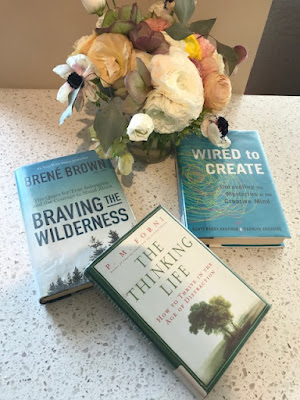A Case for The Thinking Life
Goethe: “One can be instructed in society, one is
inspired only in solitude”
I picked up these three books randomly at the library and
have been reading them simultaneously. A chapter or two from one book in the
morning, from another at night or the next day.
In “Braving The Wilderness” Brené Brown writes about
belonging and the courage to stand on your own, in your uncertainty if
necessary. She reminds us that belonging doesn’t require membership in
something external to us, experiences that involve others or agreement in
popular opinions. Yes, we all want to be
part of something, to feel connected, but it’s not to be found in the “us
versus them” culture. Belonging fully to oneself requires solitude and
searching.
But in today’s world of information overload, solitude can
be difficult to embrace for some. Which brings me to the next two books: The
Thinking Life (How to Thrive in the Age of Distraction) by P.M. Forni and Wired
to Create by S. Barry Kaufman and Carolyn Gregoire.
Both books speak about the importance of carving out
meaningful time in a world of distractions. Forni’s book (The Thinking Life)
encourages solitude for the purpose of thinking while Wired to Create
does so for the purpose of creativity. Of course, thinking and creativity are
closely intertwined.
Forni says thinking helps us make meaning of our
experiences, allows us a lens through which to see ourselves and others more
clearly.
Wired To Create emphasizes that it’s not just artists
and writers who need solitude for inspiration and creativity. Even the
businessman, the engineer, the inventor, all need time alone to shuffle through
their thoughts. When we’re alone a different part of our brain kicks into gear.
Imagine if we never allowed ourselves this opportunity? What would we be
denying ourselves, our brains?
Rather than being seen as a negative personality trait, the
capacity for solitude reveals emotional maturity. (Wow then, I must be
exceptionally emotionally mature).
In The Thinking Life, Forni cautions us to strive for
balance in our lives by “thinning out the sprawl of the trivial in it” and
setting aside time just to think. How often do we do that? We view our leisure
time as vacation time or fun time or the opportunity to get caught up on stuff,
rather than as periods of reflection. He says reflection and introspection
build up our internal resources, grounding us in who we are (back to Brené
Brown’s knowing and belonging). So that when there are disruptive external
influences, we are not as weather vanes, turning hither and thither, but we are
like clocks, relying on our internal resources.
The choice is obvious as to which one would choose to be: a
weather vane or a clock.
All the world at once at our
fingertips
Email pings and newsfeeds through
the day
Opinions posing as smart-as-whips
Absorb them all—your mind will
blow away.
All jostling to be right, the endless din
Wanting you to proclaim—I belong
there
And not here and here and here.
They want in
No, I belong everywhere and
nowhere.
“Know Thyself” can never be realized
Without
solitude to look deep inside.



Comments
Post a Comment